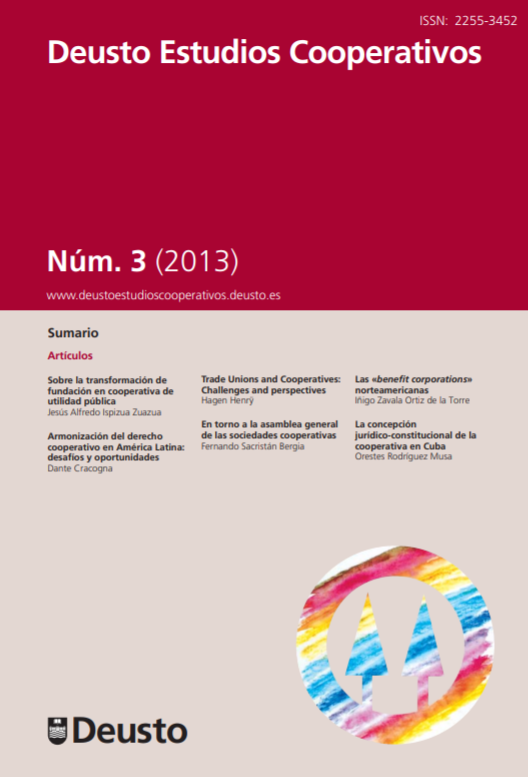Sobre la transformación de fundación en cooperativa de utilidad pública
Abstract
This article analyses the possibility of transforming a foundation into a public benefit cooperative. The author approaches this task from the position of a legal professional facing new changing social realities which current legislation does not envisage. When transformed, the main aspects of a public benefit cooperative are legitimated in the following cases: when it implies the continuity of the entity, regardless of the legal status it operates under; the purposes of the foundation and the social aim of the association are closely identified; it carries out the same activities for attainment of the foundation’s purposes as for its social aims following the transformation into a cooperative; its general interest as a foundation becomes and is expressly acknowledged as the cooperative’s public benefit; and lastly, it guarantees the ban on appropriating the assets which were originally attached to such general aims either during the life of the legal entity or upon its extinction. Furthermore, if the legal position of interested third parties is proven to have been maintained and no explicit legal or statutory ban exists which may hinder the transformation, the operational benefits of any transformation will take priority over objections stemming from the two legal institutions’ different asset or personal bases. Although the transformation may be heterogeneous and not explicitly foreseen, it is sufficiently safeguarded under such guidelines while subject to the general interest or public benefit.
Received: 03 September 2013
Accepted: 30 September 2013
Downloads
The authors, by submitting their manuscripts to the Deusto Estudios Cooperativos (DEC), accept the conditions listed below on copyright and undertake to comply with them. They do not sign any document of assignment of rights to the Publisher.
1. Authorship: The author must be the sole creator of the work or legally acting on behalf of and with the full agreement of all the authors.
2. Copyright and Code of conduct:
a) Authors warrant that their work is original; has not been previously copyrighted or published in any form; is not under consideration for publication elsewhere; its submission and publication do not violate the Ethical Guidelines of DEC and any codes (of conduct), laws or any rights of any third party; and no publication payment by the Publisher (University of Deusto) is required.
b) Authors grant to the Publisher the worldwide, sub-licensable, and royalty-free right to exploit the work in all forms and media of expression, now known or developed in the future, for educational and scholarly purposes.
c) Authors retain the right to present, display, distribute, develop, and republish their work to progress their scientific career provided the original publication source (DEC) is properly acknowledged.
d) Authors warrant that no permissions or licences of any kind have been granted or will be granted that might infringe the rights granted to the Publisher.


3.jpg)
3.jpg)







